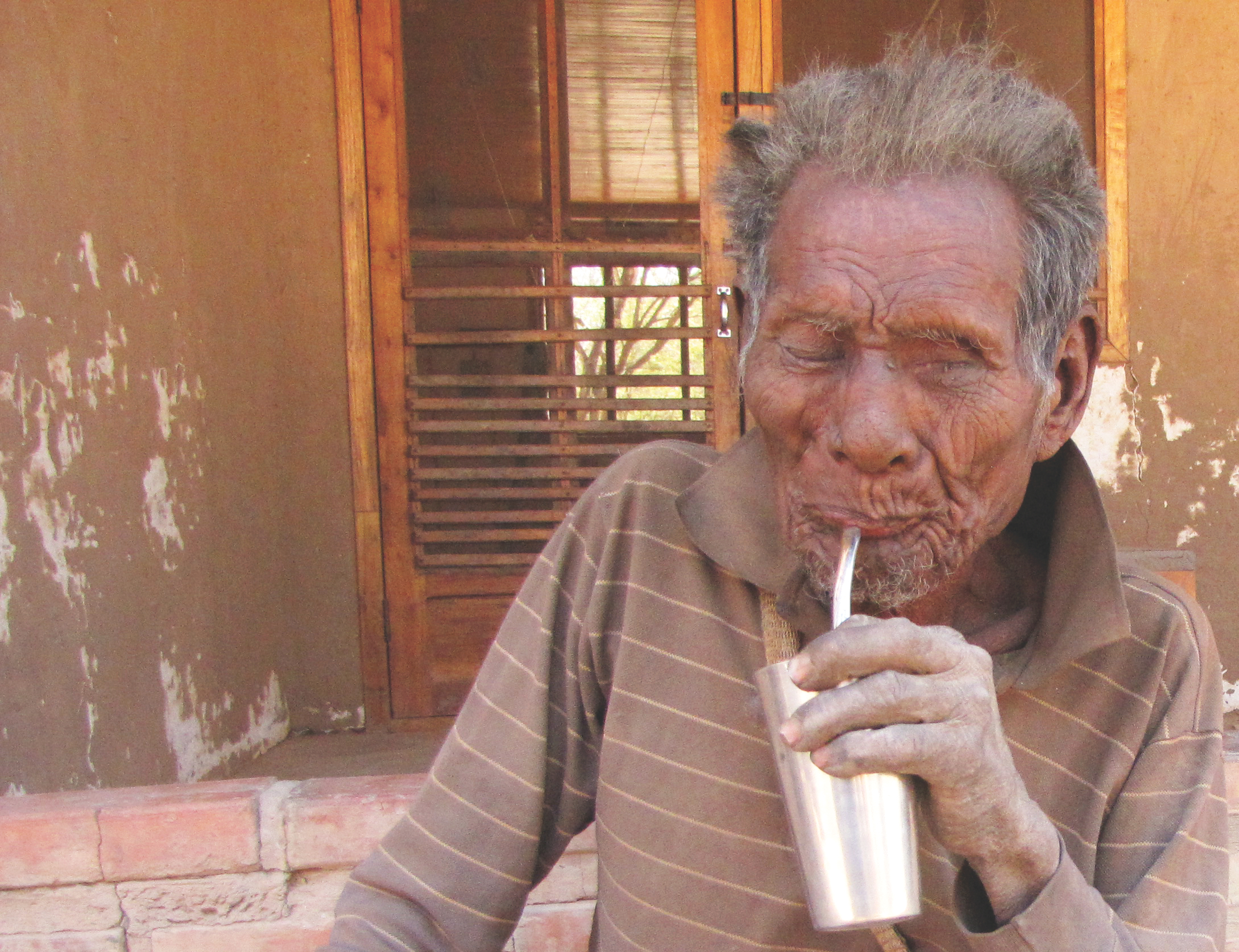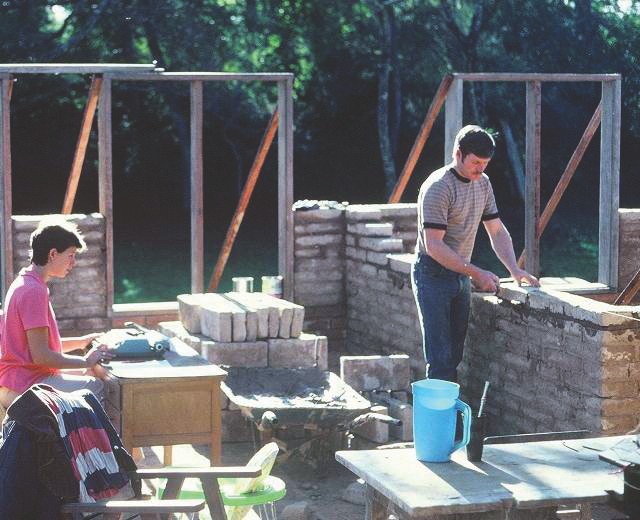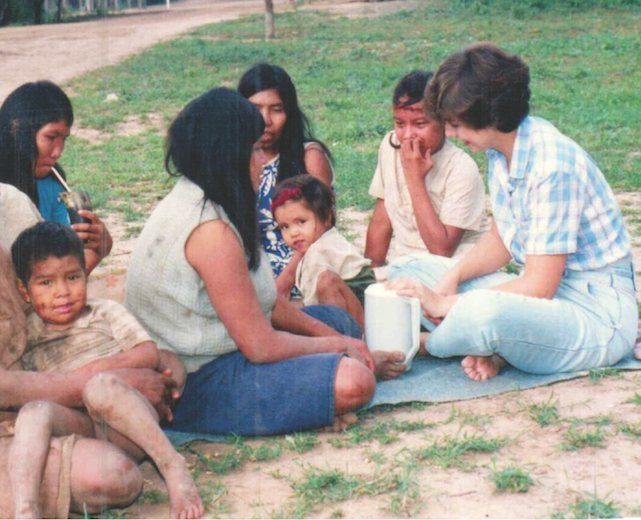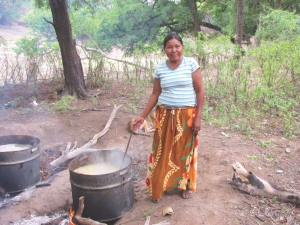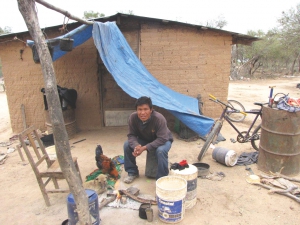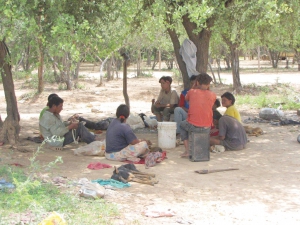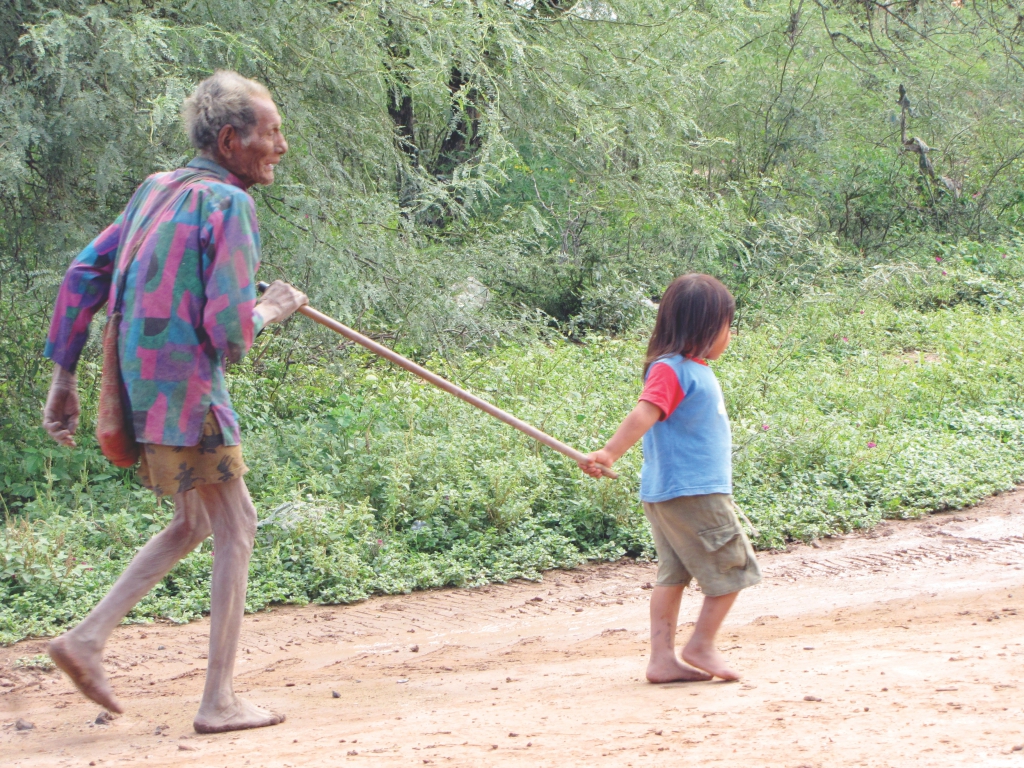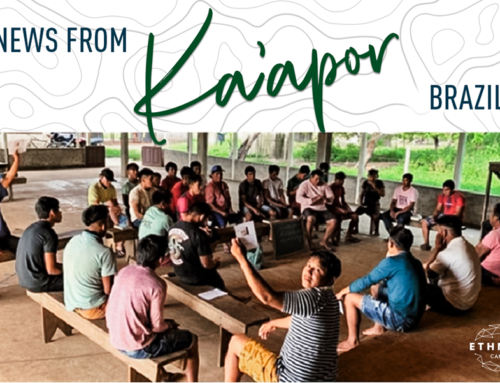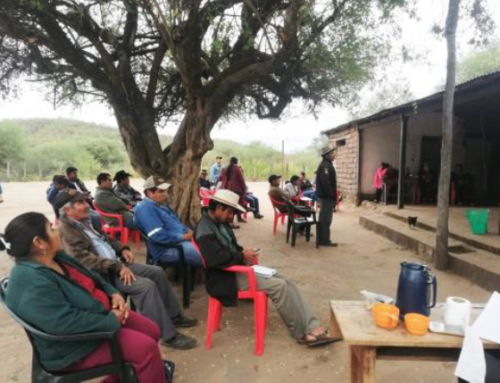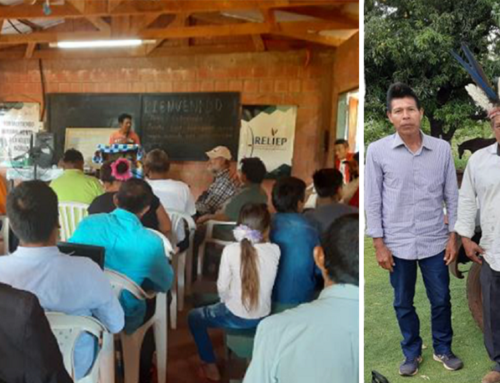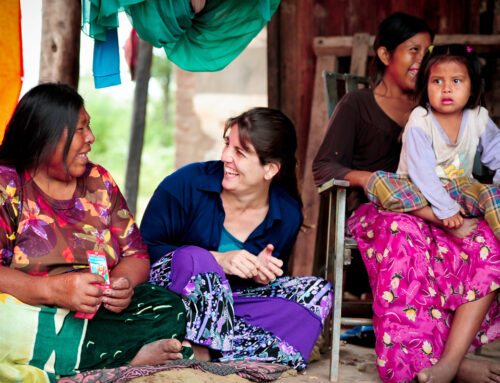I was hot and everything was dusty.
I held my fussy baby in one arm and ran the diapers into the wringer of our Maytag washer. Well that was one thing — at least I wasn’t scrubbing diapers by hand anymore.
The pounding of the generator running the washing machine almost kept me from hearing a visitor coming down the path toward our adobe house—someone else who wanted something.
I thought about pretending that I hadn’t heard anything, but I knew it would only be minutes before the visitor began “coughing” while he or she looked into every window … even the higher bathroom window.
I clamped my teeth together remembering how one lady had dragged a propane gas bottle over to that window so she could have a better look inside, and the grit between my teeth reminded me where I was — in the Manjúi village where we had moved to bring the gospel to this remote, and so far, ungrateful tribe.
“Well, if we could just get some people saved around here,” I thought, wiping my sweaty face on the back of the baby’s shirt, “but that would take learning their dialect better.”
Even the language was resistant in this remote location.
And, OK, we don’t save people — that’s God’s responsibility. Right now what I needed saving from was this filthy desert wind driving grains of sand into the lines of diapers and other clothing. I rounded the corner of the house, half-wondering why I hadn’t heard anyone scratching at the screens as they made their way around the house. Sitting next to our front door was Laweyin, the village blind man.
“A’naas!” I said, brightly, pulling God’s endless love around myself.
Laweyin replied with the same word, indicating that he had “arrived” at my place.
“So, what’s happening?” I asked in Manjúi, letting the baby down onto our dirt porch. Staying clean and keeping kids clean had long fallen off my list.
“Ta’ipa,” he replied. “Nothing, not a thing is happening.”
“Oi ezap!” “OK,” I said, “I’m not drinking tea right now, but maybe later.”
Many hours were spent drinking yerba mate (a flavorful herbal tea made from tree leaves, a popular drink enjoyed throughout Paraguay) with anyone who dropped by, and that would go on every waking hour if I always brought it out.
Dusting off the baby, I went back into the house. As I set the table for lunch, I happened to catch a glimpse of Laweyin, still in the same place, with his dog next to him.
“What’s his story?” I asked my husband, Peter, at lunch.
It was interesting — and sad. When Laweyin was about 3 years old, he developed a terrible eye infection, and his parents rubbed some ash into them, hoping for a cure. In the end, the infection healed up but left Laweyin without one eyeball and with no sight in the other.
No one told him he was handicapped, and Laweyin quickly adapted to this loss. It seemed like his ability to hear was greatly magnified. Stories were told of Laweyin and his dogs going into the jungle to hunt wild pigs with nothing more than a club.
Another story featured him shooting birds for the cooking pot with his slingshot.
Laweyin also became a shaman, and his specialty was healing children. He would be paid in food and articles of clothing for chanting over sick children, who would often recover.
Later that day I put some noodles and meat in a bowl for Laweyin and took them out. “Kama!” I said, touching the side of the bowl to his hand.
Gnarly fingers quickly grabbed the sides of the bowl and I watched as he dug out a little portion for his pet.
Almost every day, Laweyin came to sit on my porch. As the children grew, I began to expect and count on his daily visits. He had stories to tell, and he wanted me to understand them.
Laweyin became my unofficial language teacher, which solved a huge problem for me as I sometimes only had ten to 15 minutes at a time to work on learning the language, and I couldn’t afford to hire someone to sit around and wait for me to be ready.
Sitting beside Laweyin with my pencil and paper, I asked him every question I could think of — there were endless genealogies and sentence structure mysteries. As he pondered, his one eyeball would roll around like it was searching every corner of his mind for the best answer. He helped me understand difficult pronunciations — I could look right into his mouth when he spoke. He told me a thousand times, a hundred thousand times, “That’s not how you say it. Try again!”
In the cold season of June and July, one of our boys would build a fire under the water tank on the back porch.
When Laweyin arrived, one of the children would put his hand on their back, and lead him to it. He would sit there for hours, enjoying the comfort of the fire and adding sticks to it now and then. He knew that eventually I would be coming out with some strange food for him to enjoy. The only thing he ever rejected was pickles.
Years went by and language learning was finished, and God’s Word went out into Manjúi hearts. Every weekday the people would gather to hear Peter teach God’s message to them. But Laweyin never came to hear the teaching. Peter and I would take turns telling him about God, and he would listen, but never respond.
Twelve long years went by with almost no response from anyone. How our team longed to “shake the dust off our feet” and move on to a work where we could feel successful.
Then one day Laweyin came to visit.
I just didn’t feel like visiting so I asked Peter to take a break from his office work and sit with Laweyin. After a few minutes, Peter called into the house, “Honey, I think you should come out and hear this!”
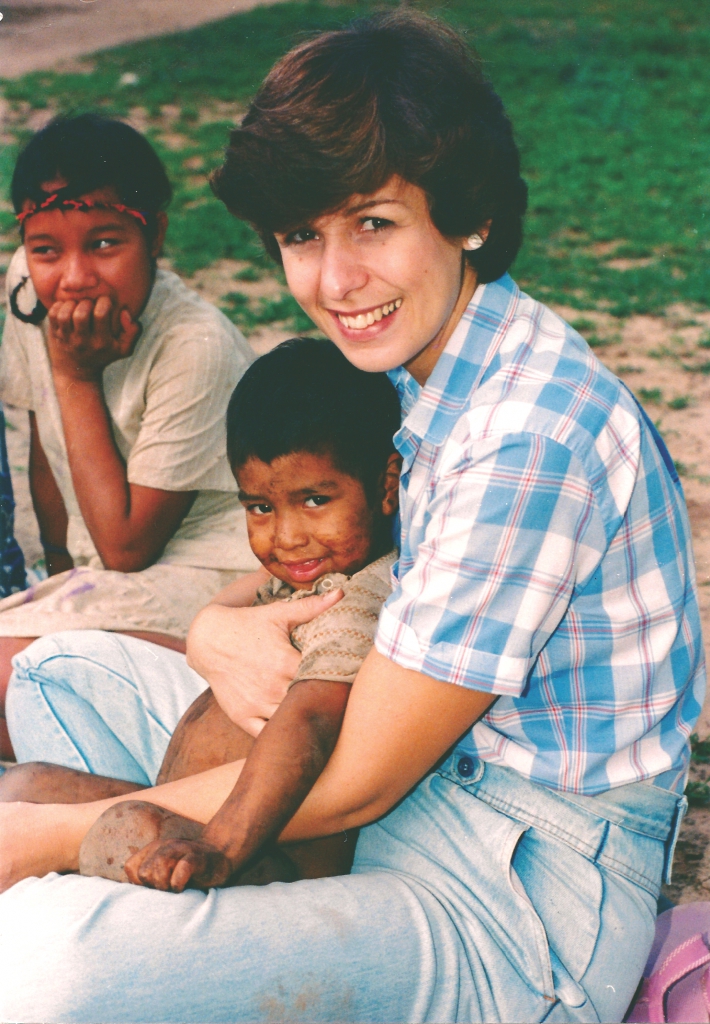
Jwiyo (centre) was one of the first Manhúi young people to come to know the Lord. Even as a teenager, he would ride his motorbike to teach what he had learned
Laweyin told us, “I was sitting by the fire one day shaking my rattle and chanting, making sure the spirits stayed familiar with my voice.
“Suddenly, fire ants attacked me. Jumping up, I brushed them off and went to sit on a wooden structure that would keep me off the ground. I began chanting again, and once more the fire ants swarmed over me. I knew then that I needed to hear about God. He wanted me to listen.”
Laweyin’s nephew, one of the first believers, began teaching him. Early one morning, Laweyin came to our house and excitedly announced, “I’m through believing Satan’s lies! I know that I have sinned, and Jesus paid my sin debt. I believe only what God says now.”
I was over the moon … and under a rock. God knew just how to get through to Laweyin — He had opened the eyes of his understanding, but why didn’t I have a more loving, giving attitude to my constant visitor? God was doing something in me as well; chipping away at hardened areas of my heart.
God changed my heart as I saw the change in Laweyin’s heart.
As time passed, the Humphreys had to leave the Manjúi ministry and assumed a member-care ministry in Canada.
Then last August, we returned to Paraguay to visit our son Shaun, his wife Mel and their three children. They minister to the Nivacle people in Paraguay. While there, we also went to visit our Manjúi friends.
As soon as I got out of the truck, I began looking around for my friend. After a time of visiting with everyone, I was able to talk with Laweyin by himself. I asked him how things were going and he replied, “I’ve had much pain and sickness. I asked God to take it away, and He didn’t. He gave me peace instead! I know I will go to live with Him when I die.”
We returned home resting in the assurance that we would see Laweyin again — even if only in Heaven. Then our son wrote to say that Laweyin had gone Home to be with God. I am so comforted knowing that his sight is now restored, and he is enjoying the bliss of Heaven and fellowship with his Savior, Jesus.
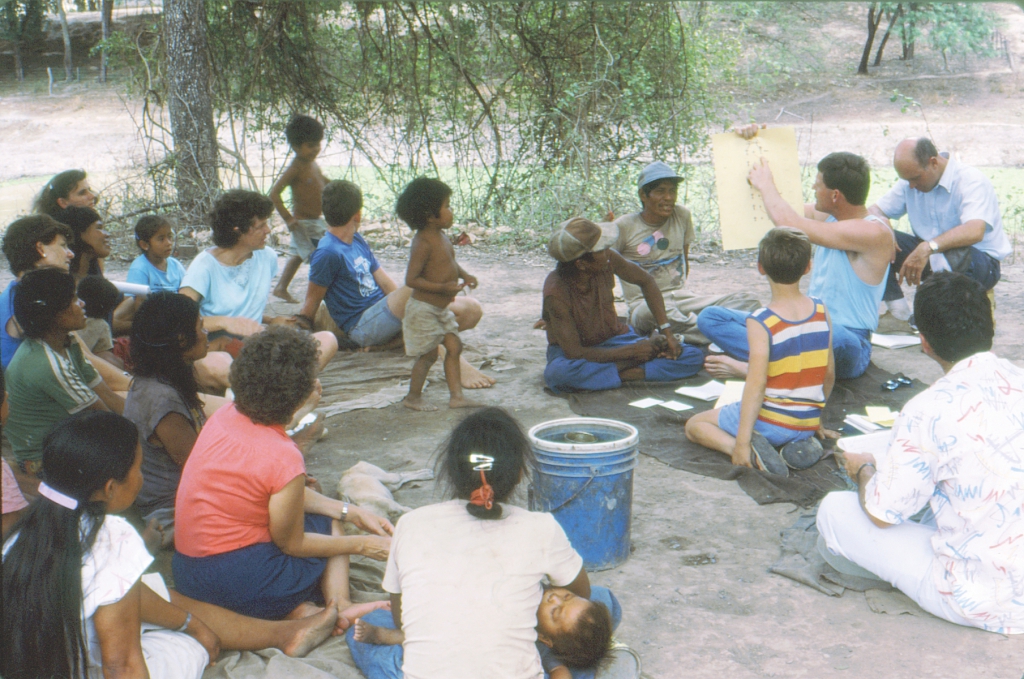
If the Humphreys and their partners had given up teaching God’s Word, we wouldn’t have Laweyin’s story.
We give God the glory for Laweyin’s salvation and promotion into His presence. The thought came to mind that this made it worth it all — all the long years of living in a dirty, dusty, remote location while suffering separation from family — but then I was reminded that Jesus said, “If you love me, you’ll obey me.” (John 14:15).
It is worth everything to obey God — even when the results don’t turn out how we want. It’s the obedience itself that is our success, and that shows we love God. I never want to forget that.
NOTE: Even when Laweyin wouldn’t listen; Pete and Leah showed God’s love to him. As they applied the principles taught in New Tribes Mission training, God was faithful to His ministry of changing lives.
The ministry has not ended. Jeff and Stacy Hunt live in the tribe and are discipling and seeing growth in the believers who heard Firm Foundations chronological Bible lessons from Peter. Jeff is seeing the fruit of his labor as well as that of co-workers who went before.
The Manjúi church continues to flourish. Soon four elders will be ordained and will take over the duties of leading the church.
The Manjúis are applying the principles that the Humphreys taught them. They have seen the need to take the Gospel to other villages and have recently sent Isnei and his wife Zitila’ out as missionaries to another language group.
Jeff’s dad, Gordie Hunt, and the Manjúi translation team have only 2 Corinthians, Hebrews and Revelation left to translate and the Manjúi New Testament will be ready for print.

